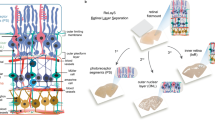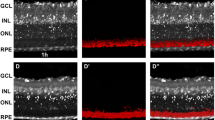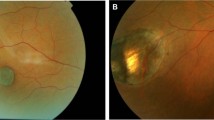Abstract
THE separation of isoenzymes by electrophoresis on cellulose acetate paper is now an established technique; the fractions can be located by tetrazolium staining according to the technique described by Barnett1. In this laboratory such an approach has been applied to the separation of the isoenzymes of lactic acid dehydrogenase in the retina of the normal and ‘retinitis’ rat during development2,3.
This is a preview of subscription content, access via your institution
Access options
Subscribe to this journal
Receive 51 print issues and online access
$199.00 per year
only $3.90 per issue
Buy this article
- Purchase on Springer Link
- Instant access to full article PDF
Prices may be subject to local taxes which are calculated during checkout
Similar content being viewed by others
References
Barnett, H., J. Clin. Path., 17, 567 (1964).
Graymore, C., Nature, 201, 615 (1964).
Graymore, C., Exp. Eye Res., 3, 5 (1964).
Barnett, H., Nature, 199, 437 (1963).
Author information
Authors and Affiliations
Rights and permissions
About this article
Cite this article
GRAYMORE, C. ‘Nothing’ Dehydrogenase in the Retina. Nature 206, 1360–1361 (1965). https://doi.org/10.1038/2061360a0
Issue Date:
DOI: https://doi.org/10.1038/2061360a0
Comments
By submitting a comment you agree to abide by our Terms and Community Guidelines. If you find something abusive or that does not comply with our terms or guidelines please flag it as inappropriate.



